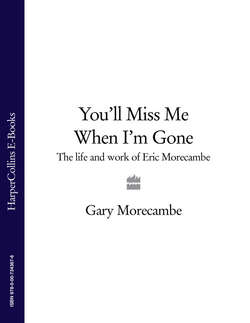Читать книгу You’ll Miss Me When I’m Gone: The life and work of Eric Morecambe - Gary Morecambe - Страница 16
‘Being a living comic legend was certainly a two-edged sword.’
ОглавлениеThe one thing that I knew so little about until very, very recently was my father’s own humble beginnings. Then, while recording a spot for a TV company filming in Lancashire, I was introduced to a few people who remembered him. One such person is Roger Obertelli, who, as a kid, along with his elder brother Kenneth, would play football with Eric in their street, Christie Avenue, Morecambe.
A fishing licence and ration book, both showing rare occasions on which Eric signed with his real birth name of John Eric Bartholomew.
Roger and his wife, now in their later years, remarkably have settled back in that same street.
He explained to me how all the kids in the street would be playing football in the late afternoon when suddenly Eric’s mother, Sadie, would appear and whisk him indoors. Ten minutes later a rather solemn Eric would re-emerge dressed in top hat and tails. With a plaintiff wave of the hand, he would saunter off down the street and across what were then open fields stretching into the distance on his way to the dance and music lessons that Sadie broke her back to fund. Roger says that they would all chuckle at Eric’s departing figure and can recall his frustration at having to leave their game of football. But you sense from Roger that now there is an air of ‘Well, he had the last laugh, didn’t he?’
Eric once outlined his own upbringing. His account could have been composed by or for the Lancashire tourist board, but it’s a genuine personal look at the seaside town’s life through the seasons by Eric as he recalled the early part of the previous century:
I was born in 1926 and when I was eight months old we moved to Christie Avenue into a new council house with three bedrooms and an outside loo. There was just me, my mother, Sadie, and my father, George…We were working class, but comfortable, even though Dad earned only £2 a week in my youth. He worked for the council…Mother supplemented our income, particularly when I began dancing lessons. She used to scrub floors and work as an usherette at the pier theatre. I had four special friends, all of us football fanatics; we supported Preston North End and Morecambe FC. We went to all Morecambe’s games for the simple reason that we got in to see them for nothing by the somewhat devious method of bending the railings that surrounded the ground…One of our favourite haunts was a sweet shop loftily named Halfway House. It was run by one of the biggest men I have ever seen. I can’t remember his name, but he was at least six feet six inches tall…
Apart from the normal run of goodies at Halfway House, there was a kind of board covered in paper and on it were dozens of black spots. You paid Mr ‘Bigman’ a halfpenny and he gave you a pencil which you forced into a black spot. If there was a number underneath, you won a prize. But there weren’t many numbers.
At home my favourite foods were shrimps, black puddings and tripe—the latter delicacies having been a staple diet for comedians’ material for years! I also loved mushrooms, which my father and I would pick from the fields around our home. But one delicacy—the taste remains with me still—was ‘cocoa dip’. Every morning my mother would mix a quantity of cocoa powder and sugar in a bag. The idea was to have the bag open in my coat pocket and keep dipping a wet finger into the mixture…It was like nectar!
When the summer came Morecambe became a different place. It was like being brought up to date; finding out what was going on in the world. You never saw many cars in those days, yet August brought a veritable motorcade of Austin Sevens and Morris Eights driven by the ‘well-to-do’, paying their three pounds a week, full board at the town’s desirable residences…
On the sands entertainment was provided by the Nigger Minstrels, then undeterred by the racial overtones of their title.
As the darkness came at summer’s end, there were the illuminations. Happy Mount Park was a fairyland and as the holidaymakers took their final glimpse of annual escape, I would warm with the thought of good things to come: Autumn and Bonfire night, winter with slides on the footpath and scarcely any rain. Spring with the town reawakening, the annual Carnival that had a West End polish to it and the grand influx of the immigrants from the mill towns, the Scots and the Midlanders. Summer again with its boat trips, bathing beauty contests and the ever-present Nigger Minstrels…
Obviously I knew my father intimately, and I sense the above was purposely drawn up in a Charles-Dickens-meets-Perry-Como way as he rendered his thoughts into print. My father could be very lacklustre when talking about his childhood days in Morecambe, but writing about them seems to have focused his mind. Certainly Eric returned often enough to the north, particularly to spend time with his parents, which my sister and I enjoyed enormously too. But it never really felt like Morecambe was his home—that this was the place that had not just given rise to its greatest son, but had lent its name to him as a vehicle for his success. I also sensed that the longer he spent away from the county of his birth—which, excepting the occasional holidays, was most of the time as our family was based in the south—the more uncertain he felt about it whenever he returned. It was a little like he wasn’t sure how to behave, because there were so many friends and family who knew Eric Morecambe before comedy did.
